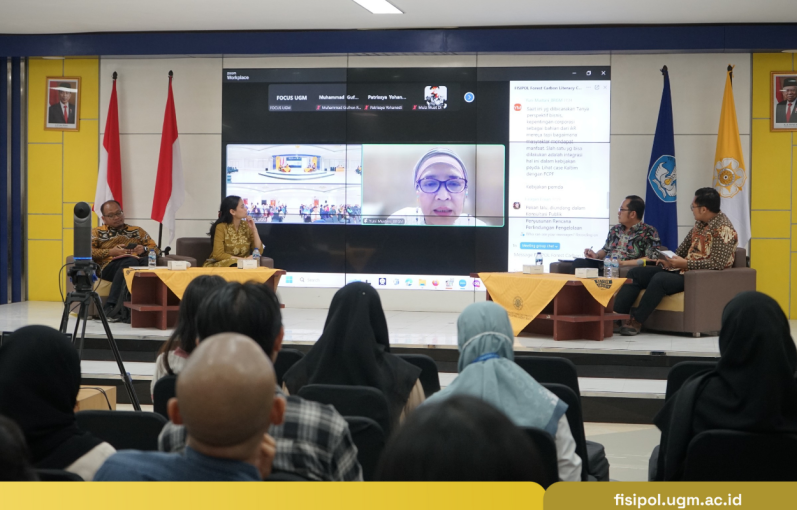
Yogyakarta, 19 August 2024─In line with the agenda for reducing the climate crisis and sustainable development, the Faculty of Social and Political Sciences, Gadjah Mada University (UGM), in collaboration with Chakra Giri Energi Indonesia (CGEI) and the Faculty of Forestry UGM launched a Forest Carbon Literacy Course. This course, along with a panel discussion entitled “Synergizing Carbon Sequestration with Social Strategies in Forest Management,” held on Monday (19/08) at the Mandiri Auditorium, 4th Floor, Fisipol UGM, is a beacon of hope. It aims to increase our capacity and understanding of sustainable forest carbon management, to face the challenges of global climate change, and to support the reduction of carbon emissions in Indonesia.
The Forest Carbon Literacy Course is a module relevant to the government’s target to reduce greenhouse gas emissions by 31.9% by 2030 through effective forest management. “The climate crisis and sustainable development agenda give rise to many new opportunities both in economics and science. “One of the opportunities that has become a global discourse in recent years and has influenced the way things work in various countries is related to carbon trading,” explained Wawan Mas’udi, DEAN of Fisipol UGM.
Carbon trading or carbon trading is buying and selling certificates given to countries that have succeeded in reducing carbon emissions from climate change mitigation activities. Until now, the carbon trading scheme is still controlled by capitalist institutions or agencies with insufficient capacity to absorb carbon and trade with countries that do not yet know carbon. Meanwhile, the main challenge faced by the practice of carbon trading is the social approach to implementing this carbon trading project.
“Co-benefit has an important influence as an indicator of carbon pricing. There will be a price difference between carbon projects with social and environmental involvement values and those without,” explained Sarah Wibisono, CGEI’s Lead Sustainability Analyst. Co-benefit is the benefit to the local environment from a policy, program, or activity.
Fisipol actively supports practical co-benefit-based carbon trading by offering carbon calculations in the Wanagama forest, Gunung Kidul, to learn how to calculate carbon and calculate benefits for the surrounding community. This discussion activity also teaches essential topics related to forest carbon, including Forest Carbon, Forest Carbon Measurement Methodology, Forest Carbon Project Management, Co-Benefits, and MRV (Measurement, Reporting, and Verification). This agenda follows the 13th Sustainable Development Goal, namely Climate Action.
